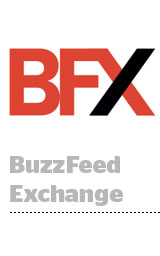
One year after first launching programmatic ads, BuzzFeed is doubling down with BuzzFeed Exchange, a formal expansion of its programmatic product offerings.
BuzzFeed’s inventory has grown to 3 billion impressions a month, up from the 1 billion impressions a month it offered when it debuted programmatic ads a year ago.
The BuzzFeed Exchange aims to make it easier for advertisers to access that scale by buying across BuzzFeed properties – including Tasty, Nifty and BuzzFeed News – and targeting those buys using its first-party data or content categories.
“BuzzFeed Native is our core, and always will be,” said Dan Walsh, SVP of global business operations, product and sales strategy for BuzzFeed. “The exchange is additive and complementary to our business, and a new way for our clients to work with BuzzFeed.”
Historically, BuzzFeed succeeded because it could identify and match micro-interest groups with branded content on social media. Now, it’s doing the same thing on its owned-and-operated properties by matching advertisers with readers more likely to be interested in that content.
For example, BuzzFeed reaches 26 million people who read “snacking” content each month – and its “snackers” segment is popular among programmatic advertisers. Similarly, it allows advertisers to access the 35 million millennial parents who visit BuzzFeed for tips and hacks to make #adulting easier. Advertisers can access pre-set or custom audiences programmatically via BuzzFeed Exchange.
BuzzFeed is also upping its game with ad units. BuzzFeed started with a few standard ad units available programmatically. Now, brands can buy native ad units (including a quiz ad unit), high-impact ad sizes and much-coveted video inventory through programmatic pipes.
For example, food-focused Tasty will run pre-roll video ads in Q4 available via private marketplace – just in time for the Thanksgiving recipe traffic rush.
When BuzzFeed started offering programmatic ads a year ago, it did so cautiously. Large groups of readers didn’t receive ads so that BuzzFeed could test their impact on critical metrics, such as article sharing.
“We wanted to do display ads the right way and make sure we were delivering on our clients’ expectations without interfering with our user experience,” Walsh said.
BuzzFeed limited access to its inventory when it started, only connecting to Google AdX. Now it works with nine exchanges.
Developing a strong programmatic offering is part of BuzzFeed’s strategy to diversify revenue, Walsh said. Programmatic has also diversified its advertiser base with many new clients now working with BuzzFeed who don’t need custom content.
The Trade Desk, which worked with BuzzFeed to make the publisher’s custom ad units and video units available through its platform, said that the BuzzzFeed Exchange points to the continued maturation of programmatic.
“The more premium publishers like BuzzFeed lean into programmatic as a channel, the bigger the opportunity continues to get for brands and marketers,” said Tim Sims, SVP of inventory partnerships for The Trade Desk.
This post was syndicated from Ad Exchanger.

